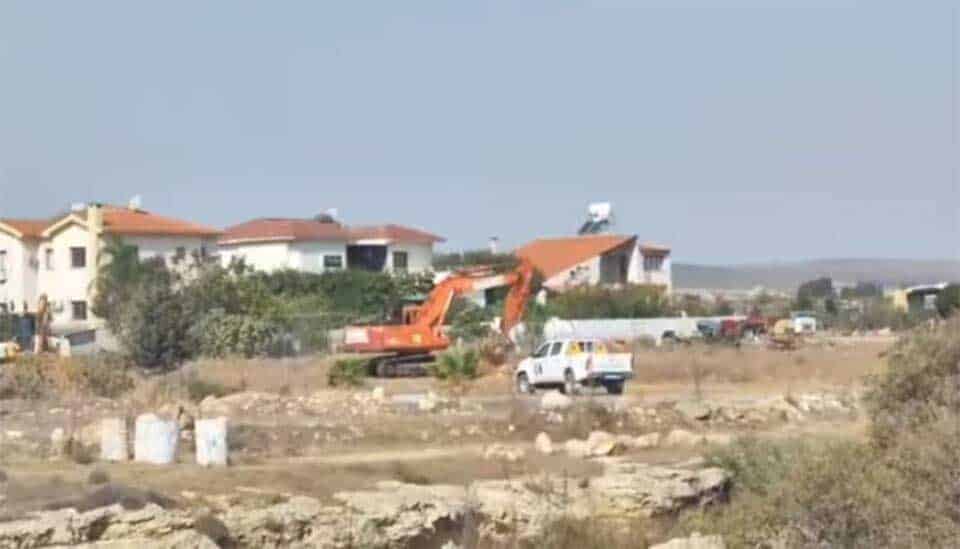Speaking at the 19th Economist summit in Nicosia, Colin Stewart, the UN Secretary-General’s Special Representative, said the understanding reached between the two sides on the issue of Pyla was a hopeful sign that other difficult issues could be approached with the same constructive attitude.
Considering the current stand-off in Pyla, with all work being stopped a few days after it began, because of disagreements between the two sides, someone could think that Stewart’s comments were tongue in cheek. It was not the case, as the Special Representative earnestly explained. “From August to October this year, we faced a difficult and sensitive crisis around the bicommunal village Pyla/Pile. Through constructive dialogue and by addressing the concerns of both sides, we were able to come out of it with a very positive consensus on a way forward.”
The very positive consensus did not go very far forward, probably because Stewart made a separate agreement with each side which the other side was not privy to. Foreign minister Constantinos Kombos said as much at the House, a few days ago.
It would appear there were aspects of the agreement made with the Cyprus government which the Turkish Cypriot side objected to, something made clear by ‘foreign minister’ Tahsin Ertugruloglu at a news conference he gave the previous week, about the opening of building plots in Pyla by the Cyprus government.
“We do not associate these works with the road,” he said. “We met with the UN, but suddenly, work vehicles entered these agricultural lands and started working. It is a mistake to think that in return for this road project we will give something to the Greek Cypriots. This is a mistake the UN made.” Considering that neither side saw the agreement Stewart had made with the other side, it might be more appropriate to call the mutual understanding brokered by the UN, a misunderstanding. And now Stewart is having meetings in an attempt to sort out the misunderstanding he caused.
President Nikos Christodoulides said on Monday that the UN requested a short pause on the work being done by the Greek Cypriots, but the pause has still not ended, with Stewart presumably having failed to secure any form of understanding. If anything, things have taken a turn for the worse, with Turkish troops having moved to an area adjacent to where the work on the opening of plots was taking place; this was the reason the work stopped, and workers left the area on Monday without returning yet.
A report in the Turkish pro-government paper, Yeni Safak (as published by the PIO service) said the 7.5km stretch of road joining Pyla to Arsos had been completed, but a problem arose due to the Greek Cypriots working on opening plots around the 4km of the road in the buffer zone. It also reported, quoting sources in the area, that if the Greeks stayed in this area, Turkish troops would move in; they also accused the UN of acting like “the lawyers of the Greek Cypriots”.
Turkish Cypriot objections were also brought up in a telephone conversation between Ersin Tatar and the UN Secretary-General Antonio Guterres on Monday, the former accusing the Greek Cypriots of attempting to create faits accomplis in the buffer zone.
The Cyprus government has avoided going on the offensive, restricting itself on arguing that the work it had undertaken had been agreed with the UN, something the UN has not denied. Acting government spokesman Yiannis Antoniou, speaking on Alpha News, conceded there was a wider issue at stake. “The problems arising at this moment are to do with the nucleus of the property issue,” he said.
The area in which the residential development would take place, he explained, included state land belonging to the Republic as well as land belonging to Greek Cypriot and Turkish Cypriot individuals. The government was claiming jurisdiction over the land owned by a Turkish Cypriot, even though the Turkish Cypriot may have ceded this land to the ‘TRNC’ in the eighties in order to be given property elsewhere. The Turkish Cypriots claim this land belongs to the ‘TRNC’, whereas the Republic has jurisdiction because the Turkish Cypriot was a citizen of Cyprus Republic which had the authority to requisition the land, said Antoniou.
This is the kind of pettiness which has plagued the Cyprus problem for decades, the politicians obsessed with sterile point-scoring, which they sell to their public as big victories, thus maintaining the toxic climate of suspicion and paranoia. In the case of Pyla, the building of a road was not an unreasonable demand but the Cyprus government claimed it would offer the Turkish side a big military advantage, and demanded concessions in exchange. These were granted by the UN, but the Turkish Cypriot side believed it got the raw end of the deal. Not satisfied with this, the government also decided to prove it had the authority to utilise Turkish Cypriot-owned land, fully aware that it would spark a reaction.
A difficult issue may have been approached by what appeared to the UNSG’s Special Representative, to be a constructive attitude, but he should understand that this does not last. Negativity, pettiness, point-scoring, short-termism are the only values of the Cyprus issue, which is why nothing has changed on the ground since 1974. The Greek Cypriots have yet to realise that this works exclusively to the advantage of the Turkish side.







Click here to change your cookie preferences